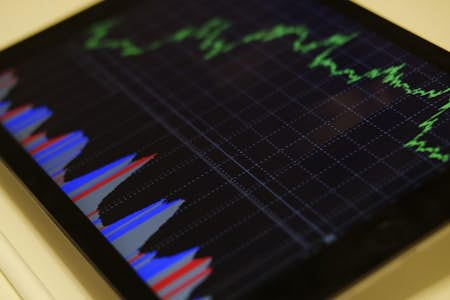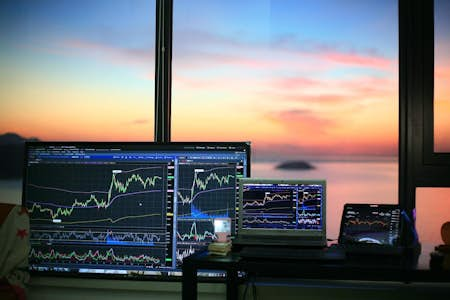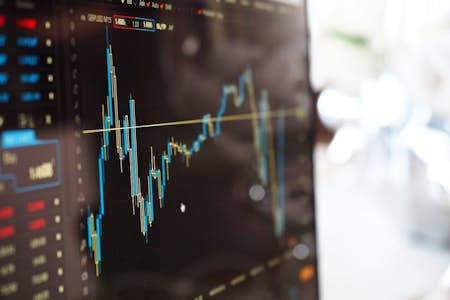Forex trading has been around for years but is now a far more accessible prospect to the average retail investor and even beginner investors. Why? One reason is there are far more online Forex brokers, making it easier for anyone to trade within the foreign exchange market. Easy sign-up procedures, mobile apps, and strict Financial Conduct Authority regulations mean currency trading isn't only for professional traders with years of experience.
That's not to say that Forex trading is suitable for everyone. For example, if you're nearing retirement, you will have requirements that may or may not make this financial market appropriate for you. Read on to learn why Forex trading can be a good idea but also the potential disadvantages of trading foreign currency.
Discover the UK's leading investment platforms, whatever your investment goals. Click on a provider below to get started!
What is Forex?
Forex is short for foreign exchange. The term Forex relates to when currency pairs are exchanged for one another to make money. We have all exchanged the British pound for the Euro or the US dollar before going on holiday. But while, technically speaking, that is Forex, Forex day traders seek to make money from an exchange rate by exchanging high quantities of currency over a day, week, month or year.
What are the pros and cons of Forex trading for over 50s?
It pays to know the pros and cons of Forex before you start trading in currency markets. Keeping these in the forefront of your mind is vital when performing any technical analysis in relation to your risk profile. Doing so means that you improve your chances of making the best trades for you without putting too large an amount of money at risk.
Pros of Forex trading for over 50s
Liquidity
Currency exchange markets are among the most liquid markets out there thanks to the amount of money exchanged throughout a trading day, the number of market participants and the number of potential currency pairs available. Plus, the market has an extensive secondary market with both futures and forward trades (over the counter or otc trades) providing support for the spot FX market.
That's great if you're over 50 and getting started with Forex trading, as it means you can be confident you can sell an asset should you need to. That's key in risk management as there can be adverse effects on a portfolio if you cannot sell an asset when you would like.
Leverage
While it is possible to leverage many asset classes by borrowing money to buy or sell more, within FX, trading leverage can be advantageous. Returns on currency price movements are usually relatively small in absolute terms. Therefore, to make the returns more significant, leveraging a position can help bolster profits. CFDs and derivatives on currency fluctuations can help exaggerate returns as well.
Quick market
One of the reasons that trading Forex pairs is so popular is the possibility of quick returns. As previously mentioned, the currency market� is incredibly liquid. Some of that liquidity is down to the fact that it is always open. That means when coupled with the high number of market participants that the market is swift. As a result, exchange rates on major currency pairs, in particular, are constantly changing. That can be a bonus if appropriately managed. Investors can make many trades a day from their trading account and earn returns on all of them, as the market is guaranteed to move.
If you are over 50 and looking to make up a hole in your retirement pot, making up that hole before retirement day is of the utmost importance. Doing so as quickly as possible is vital so you can begin earning compound interest on what you have made. Plus, making up a hole in your retirement pot ultimately means you will have more money to play with in your retirement.
Possibility for high returns
If you have an effective trading strategy, you can make money from trading GBP/USD, EUR/USD and every other currency pair out there.
Cons of Forex trading for over 50s
Possibility of losses
Of course, as is the case when there is a potential for high returns, there is usually a corresponding potential for high losses. That is definitely the case with trading Forex, particularly if you leverage your positions. Given the high returns many investors chase in the Forex market only transpire when they leverage their position, the likelihood of losing more than you can afford is high.
Complex
Another significant consideration when deciding whether traditional or online trading in Forex is suitable for you is how complex the foreign exchange market is. Currencies are so dependent on so many factors and variables that it can be hard to predict their direction of travel. And, as currency exchange always requires two currencies, there is twice as much work to do for just one trade. This is because you have to weigh up all the variables and influences on both currencies to determine what direction they will move in comparison to one another. Coupling that with how fast-moving the market is means you have to do twice the work in far less time.
Volatility
On top of those variables, one of the reasons the Forex market is so challenging to make consistent returns from is that it is a highly volatile market. Currencies are constantly moving in value due to their geopolitical backdrop, the general global economy and market sentiment - to name just a few factors.
Volatility is something that many older investors like to move away from when nearing their investment timeline endpoint. Volatility means there is a high chance of short-term losses that are difficult to make up with a shorter investment horizon. Instead, the norm is for those nearing their investment end date to move their asset allocation to be far more heavily invested in bonds and other 'safer' investments. The intention is to help preserve capital which is of increasing importance the closer to the end of an investment horizon you are.
Why have a specific Forex trading strategy for over 50s?
Given the pros and cons of Forex trading, implementing a robust trading strategy is an effective way to mitigate risks while taking full advantage of the benefits. To that end, there are ways that you can make volatility work for you. For example, you can put in stop-loss orders with your online trading platform. This means you exit positions at a price you are happy with even though it means you realise a loss. The reason being is that it means that you can control or limit your losses so that your downside is minimised to a level you are comfortable with.
Additionally, staying informed about the currency market can also be an effective risk management tool. Staying informed can mean all manner of things but understanding the geopolitical backdrop of the countries whose currencies you trade is essential. Plus, you can look at other factors like trading behaviour or patterns.
Whatever your Forex trading strategy is, you must be sure that it fits your risk profile and the rest of your portfolio. Your current level of portfolio diversification can have a significant impact on how you trade Forex. For example, if most of your portfolio is invested in bonds or safe-haven assets, you can take on far riskier trades in your Forex trading account. Alternatively, you could have a portfolio that is more skewed to chase higher returns through riskier investments. If that is the case, you may want to stay with trading less volatile currencies when managing your Forex trading investments.
What is the best forex trading platform for over 50s?
If you are still keen to invest in Forex, having considered all the risks that come with it, you will need to open a trading account. Nowadays, that will invariably mean using an online trading platform or app. When researching possibilities, it can be a good idea to look for the following features to ensure you're getting the right product for you.
Demo account
Given the complexities of the Forex market, you need to ensure that your chosen platform promotes your ability to trade in currencies effectively. Some trading platforms will work for you better than others simply because of how you work and how your brain ticks. Bearing that in mind, try to look out for platforms that provide a demo account for you to play with first before making a cash deposit.
Demo accounts let you practise with a platform's software and interface so that you know you can use them adeptly. Any software you find clunky or that hinders your ability to trade should indicate you need to look elsewhere.
Technical indicators
Research and analysis are two tools that you will likely want to use when investing in Forex. They are great ways to give yourself the ability to make profitable trades as often as possible. The best trading platforms will have tools that provide technical indicators to help you implement your trading strategy easily and efficiently.
Real-time data
To place the best trades, you need accurate data at your fingertips. Without it, you are essentially trading blind. Ensure that your potential trading platform provides real-time data, and look at how it ensures that real-time data is accurate. If it does not provide real-time data, you risk making trades using inaccurate numbers that may eradicate any chance of realising a profit. The margins are often so small in the Forex market that returns are easily reduced if the wrong calculations are made. To make intelligent calculations and decisions, you need the correct data.
Does age matter in the Forex market?
Age is irrelevant in the Forex market. A return is a return at the end of the day. However, that is looking at the art of investing in a void. In practice, we are all investing with an endpoint in mind.
When you're over 50, that endpoint is usually a retirement date. And the older you are, the sooner your retirement date is going to be. You need to ensure that you have enough time to recoup any losses you make. When you retire, you need the largest pot of money you can to ensure you enjoy a comfortable lifestyle. Losing money through riskier investments, like the Forex market can be, should be taken into consideration. Doing so will ultimately ensure that there is no unnecessary risk that will negatively affect your portfolio.







